Key takeaways:
- Privacy advocacy is crucial for empowering youth with knowledge about their digital rights and navigating online risks.
- Youth programs enhance confidence and knowledge, fostering active engagement in privacy discussions and initiatives.
- Challenges youth face include lack of awareness about privacy risks, rapid technological changes, and peer pressure regarding online behaviors.
- Effective advocacy strategies include building relationships, leveraging storytelling, and collaborating with diverse community stakeholders.

Understanding privacy advocacy
Privacy advocacy is essential in today’s digital landscape, where our personal information can be easily accessed and exploited. I remember the first time I realized just how vulnerable we are: it was during a community meeting where a young woman shared how her online data was misused, leading to real-world consequences. How many of us have faced similar situations without even realizing it?
To me, privacy advocacy isn’t just about protecting data; it’s about empowering individuals, particularly the youth who often don’t understand the stakes involved. I’ve seen firsthand how important it is to equip young people with the knowledge to navigate their digital lives safely. When we engage youth in discussions about their online presence and privacy rights, it’s like handing them a toolkit for the future.
For many, privacy may seem like a distant concern; however, moments like these remind me that being proactive is crucial. When I speak about digital footprints and their lasting impact, I’m not just sharing facts—I’m sharing a call to action. What if we all took a step to mentor someone, helping them understand their rights and tools for privacy? Trust me, the ripple effect of such an effort can be profound.
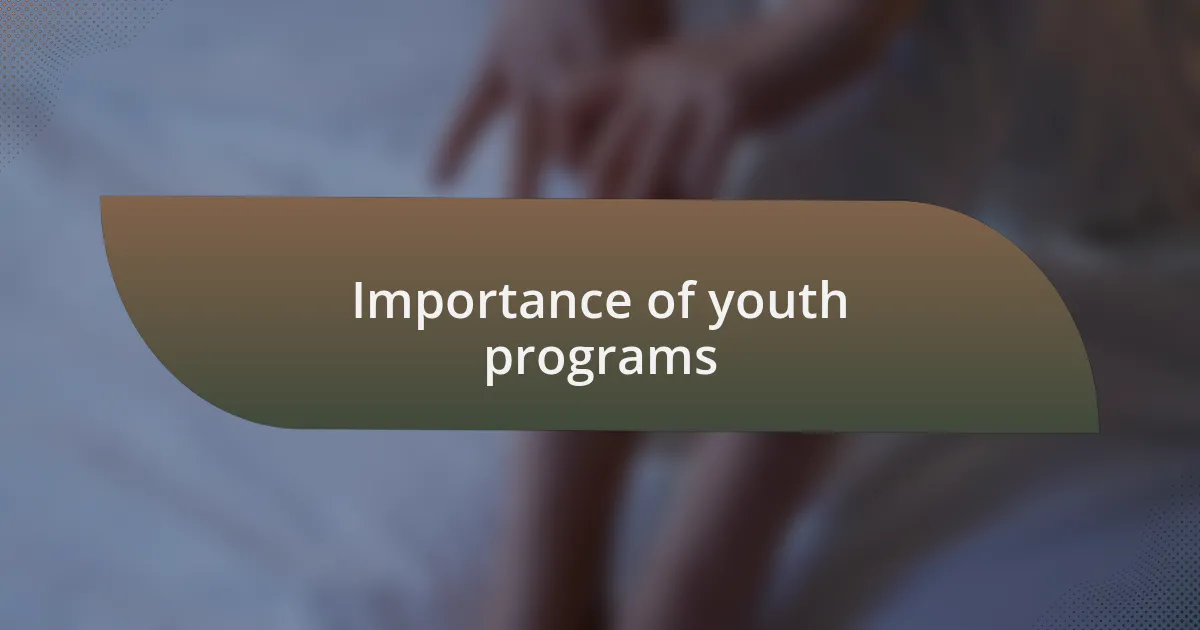
Importance of youth programs
Youth programs play a pivotal role in shaping the future, especially in fostering skills that empower young individuals to navigate the complexities of their digital environments. I once volunteered at a local youth center, witnessing how even a few workshops could spark enthusiasm among teens to learn about data protection. Isn’t it remarkable how these programs can ignite curiosity and critical thinking in young minds?
Moreover, engaging youth in structured programs can significantly enhance their confidence in advocating for their privacy rights. I recall a group of teens who, after attending a series of sessions on online privacy, banded together to create a social media campaign. Their initiative not only educated their peers but also made them feel like active participants in the conversation about privacy. How can we underestimate the power of igniting such movements among our youth?
Additionally, these programs serve as safe spaces for young people to explore their concerns and questions about privacy without judgment. I remember how one young participant, who initially felt intimidated by the topic, gradually opened up about her experiences online. Watching her gain assurance in voicing her thoughts was a powerful reminder of just how critical these initiatives are. What could be more empowering than giving our youth a platform to express themselves and learn?
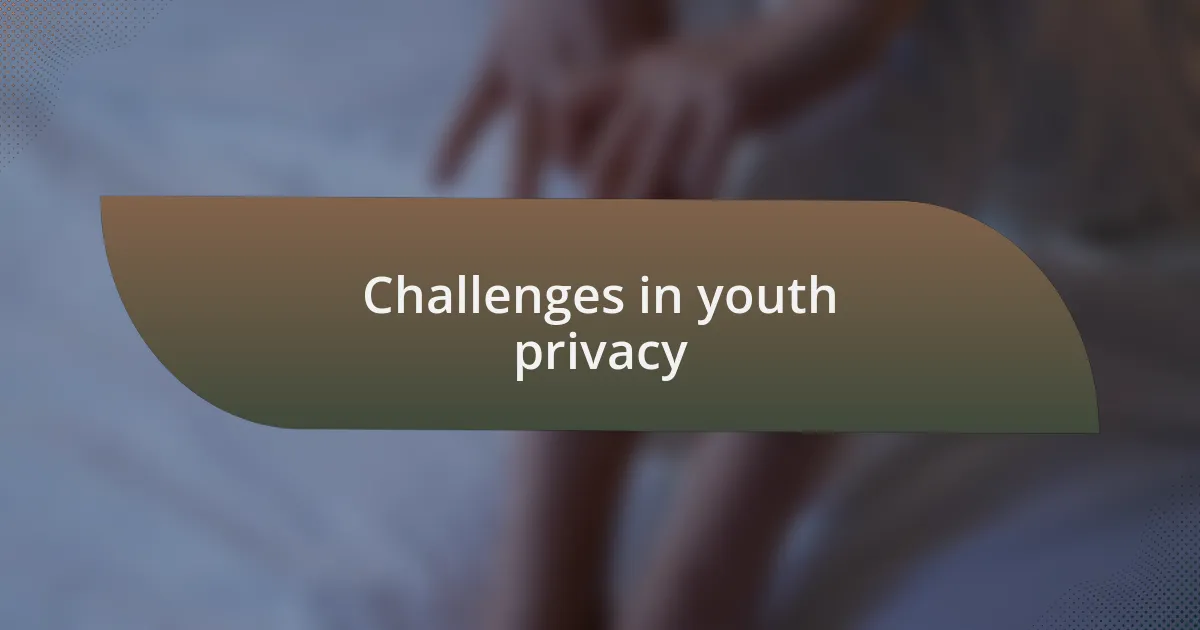
Challenges in youth privacy
Navigating privacy in a digital age poses significant challenges for youth, many of whom are unaware of the risks involved in sharing personal information online. I remember one teen I once worked with who frequently posted details about her life, unaware that such openness could lead to real-world repercussions. Isn’t it concerning how easily young people can compromise their safety just by wanting to connect and share?
Furthermore, the rapid pace of technological advancement often outstrips young people’s understanding of privacy rights and responsibilities. I observed that even those who seemed tech-savvy struggled to comprehend complex privacy settings on social media platforms. It’s disheartening to think that while they are adept at using technology, they may not fully grasp how to protect their digital footprints.
Peer pressure also complicates the matter; young people often feel compelled to conform to their friends’ online behaviors, which may not prioritize privacy. I remember facilitating a discussion where a young man shared how he felt uncomfortable with a group that routinely shared intimate details online. His confession sparked a broader conversation about the collective responsibility we all share in fostering a culture that respects privacy. How do we encourage young individuals to challenge this status quo?
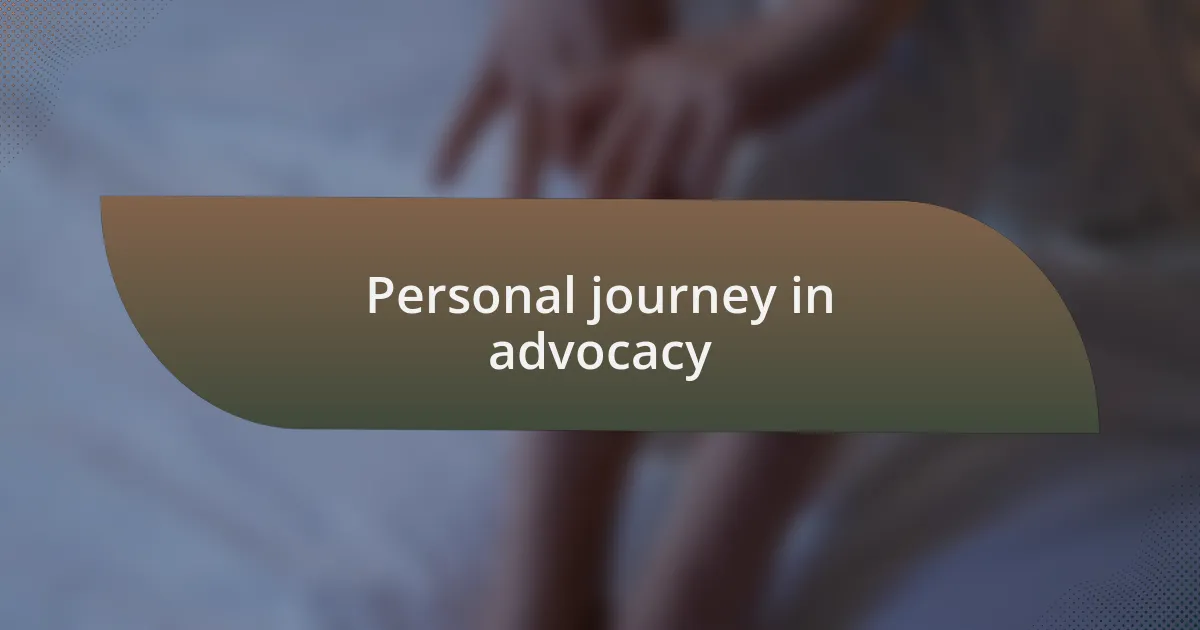
Personal journey in advocacy
Advocating for youth programs has been a transformative journey for me. I recall my first experience at a community meeting where I felt a mix of excitement and apprehension. Listening to the voices of young people, I realized how essential it is to create supportive environments that prioritize their privacy. Their eagerness to share their stories reminded me that advocacy isn’t merely about policy; it’s about fostering trust and understanding.
There was a moment that profoundly shaped my perspective on advocacy. During a workshop, a young girl opened up about her fears of being judged based on her online presence. Her vulnerability sparked something in me—a realization that advocacy is about amplifying these voices so they are heard. I found myself wondering: how often do we create spaces where young people feel comfortable discussing their privacy concerns?
Engagement in youth programs is not just about protection, but about empowerment. I often reflect on how we can equip young individuals with the tools and knowledge to assert their rights in an increasingly complex digital landscape. The question lingers: can we truly make a difference if we don’t listen to their experiences? This inquiry drives my dedication to advocacy and fuels my passion for educating youth about their privacy rights.
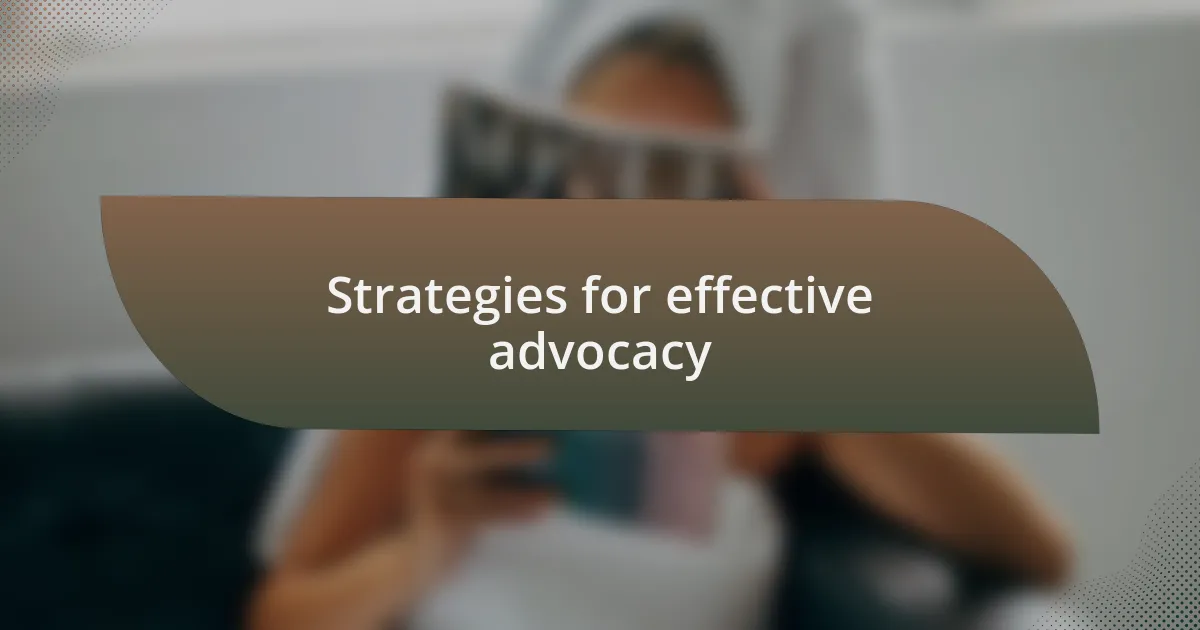
Strategies for effective advocacy
To impact youth advocacy effectively, I’ve found that building genuine relationships is crucial. At one community workshop, I connected with a group of teens over lunch, where they felt safe to talk about their experiences. This laid the foundation for a trust that made our discussions about privacy not just informative, but transformative. Isn’t it interesting how shared experiences can break down barriers?
Another strategy I embrace is leveraging storytelling. I recall a local high school project where students shared their own narratives about navigating social media. Their stories not only engaged peers but also sparked discussions about privacy risks. How often do we consider the power of a personal story to resonate with others? It’s astounding to see how these narratives can illuminate issues that might otherwise remain unspoken.
Finally, I believe in the importance of collaboration across diverse sectors. Partnering with educators, parents, and tech companies can create a more comprehensive understanding of youth needs. During a recent panel discussion, we tackled the gap in digital literacy education together. It made me realize how collective efforts can amplify advocacy—after all, isn’t it true that we achieve more when we unite for a cause?
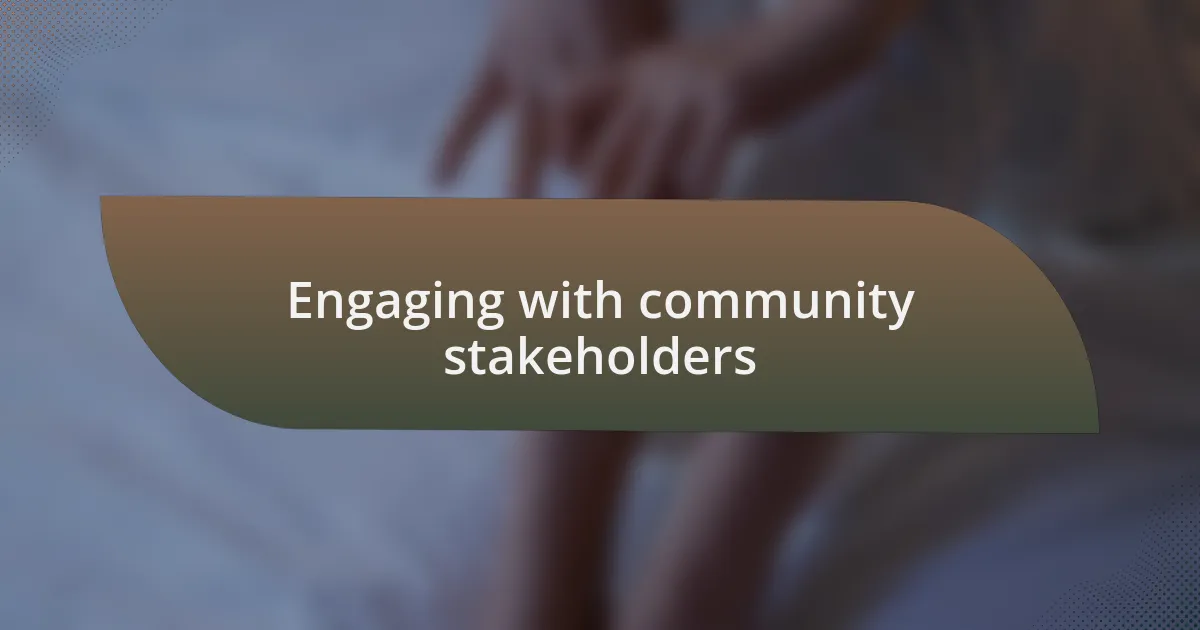
Engaging with community stakeholders
Engaging with community stakeholders has taught me the value of active listening. I remember attending a community meeting where parents voiced concerns about online safety. By truly hearing their experiences and fears, I felt a shift in our dialogue. It’s amazing how much you can learn when you allow others to share their stories. Do we often stop to think about how listening can bridge the gap between different perspectives?
Moreover, I’ve discovered that involving youth in discussions about their own advocacy is incredibly empowering. At a community fair, I invited several young people to share their thoughts on privacy issues in a casual setting. The energy in that space was palpable; they articulated their challenges so clearly. Could it be that engaging them directly leads to solutions that feel more relevant and sustainable?
Additionally, I have often sought out local businesses as partners in advocacy. One summer, I collaborated with a tech startup to host workshops on digital privacy. Their commitment not only provided resources but also demonstrated to the youth that their voices mattered in the tech landscape. Isn’t it powerful when stakeholders see their roles in uplifting young people? It truly opens up new possibilities for everyone involved.